Due to certain musical prejudices I was hitherto unaware of hosting, the prospect of listening to a rap album by a white, assumedly middle-class Canadian songwriter initially struck me as somewhat unappealing, if not entirely uninteresting; an unsavoury mixture of musical bacon and ice cream. However, delving further always helps. On Lullabies and Wake-up Calls, Dinah Thorpe’s third full length “song cycle”, the Toronto-based artist interlaces the organic and the mechanical; the playful and the bureaucratic – most impressive of all is the fact that she makes it all seem so effortless in the process. Despite the record’s political outlook, inspired in part by the radical anti-capitalist politics of the Occupy movement, Lullabies and Wake-up Calls prescriptively sugar-coats these issues through a shimmering array of pop melodies, all without diluting the lyrical content. Despite the heaviness of these themes, Lullabies and Wake-up Calls contains the giddy weightlessness of an MP3 file. By the end of the LP my feelings towards Dinah’s music were much more hyperbolic: I wondered if she had the potential to take rap to exciting and intelligent – excitingly intelligent, if you like – new places. You could say that the genre has come round full circle again.
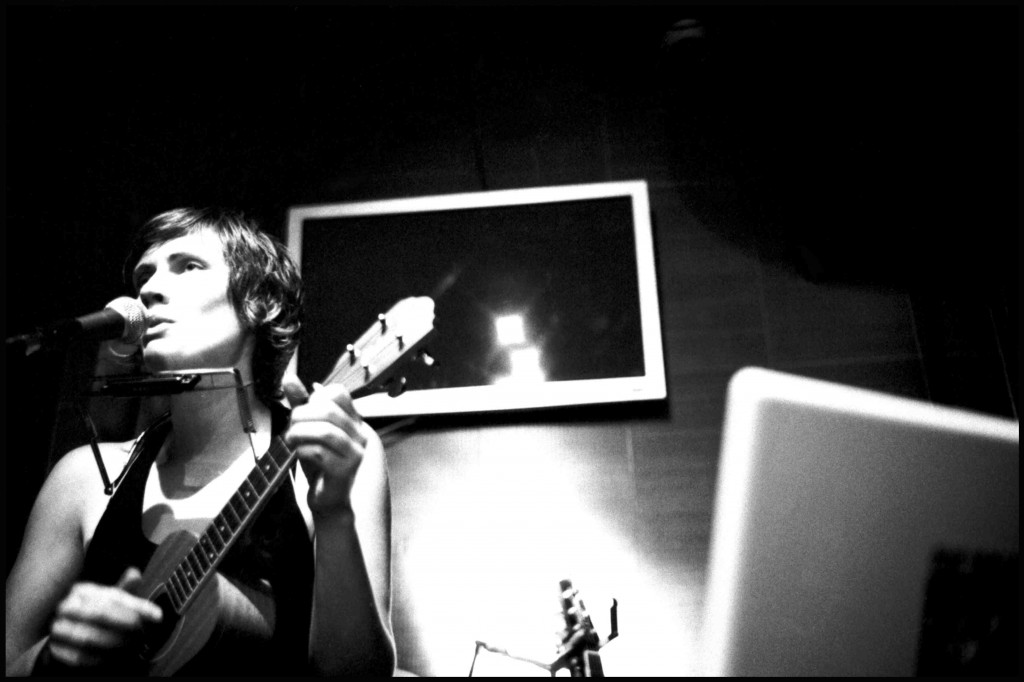
Mandy Malazdrewich
This unique ‘soundstress’ follows a path laid down by the stannic, man-machine pop of electronica godfathers Kraftwerk, to the more user-friendly perturbations of the Eurythmics. However, unlike those artists, Dinah’s lyrical sensibilities are more personal in tone, combining contemporary issues of the day through her own perspective as feckless citizen of Rob Ford’s Toronto. Interestingly, there are clear glimpses of the human wrapped up within the man-machine. Accordingly, Dinah’s persona can be divided between Dinah as idealistic, good-natured citizen, and Dinah as steely-eyed cyborg. On ‘Can I See What’s In Your Backpack’ Dinah’s automaton persona attacks the joylessness of our new-found penchant to communicate over cybernetic lines, leading her to declare that “I think it’s time to dismantle the internet,” like a cyborg rallying against the genesis of its own inception.
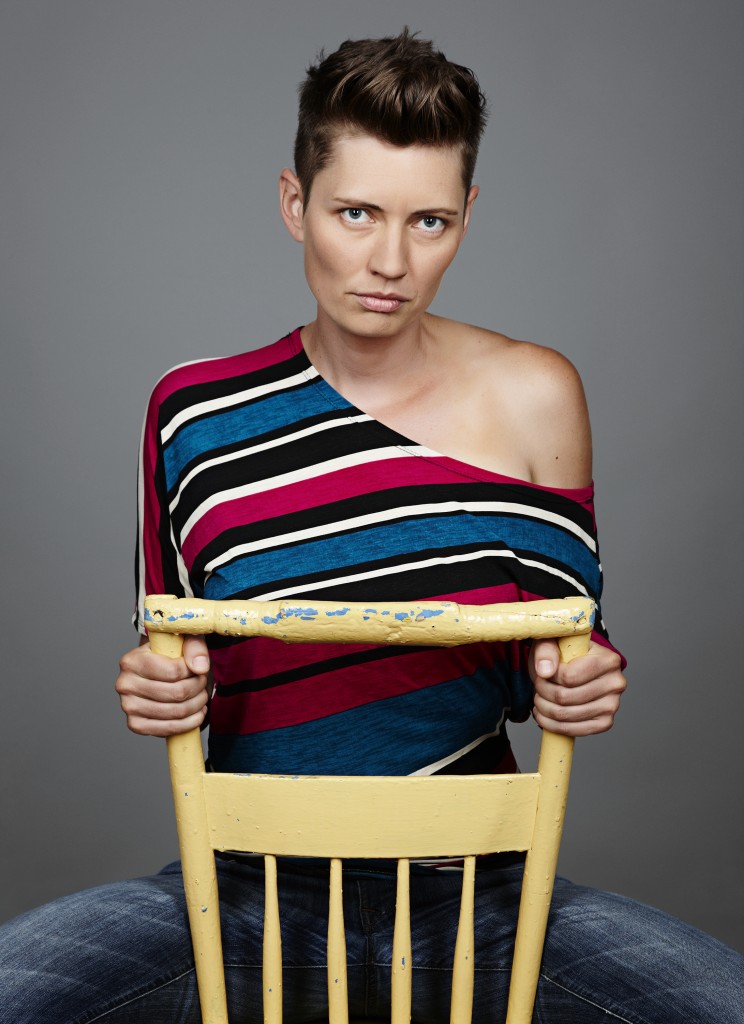
Janet Kimber
Alongside the rap tracks we have a more plaintive selection of acoustic songs, including the fragile a cappella of ‘Mining For Gold’; the likes of which provide a break from the ceaseless whirling of machinery. In running an algorithm of likeliness inside my own music-mottled mind, Dinah’s closest contemporary in the music world is probably her Toronto-based counterpart, Peaches, who resides on the more extroverted side of a joint compulsion held by both artists that we should be getting much more physical with one another, and much less ephemeral in this information age.
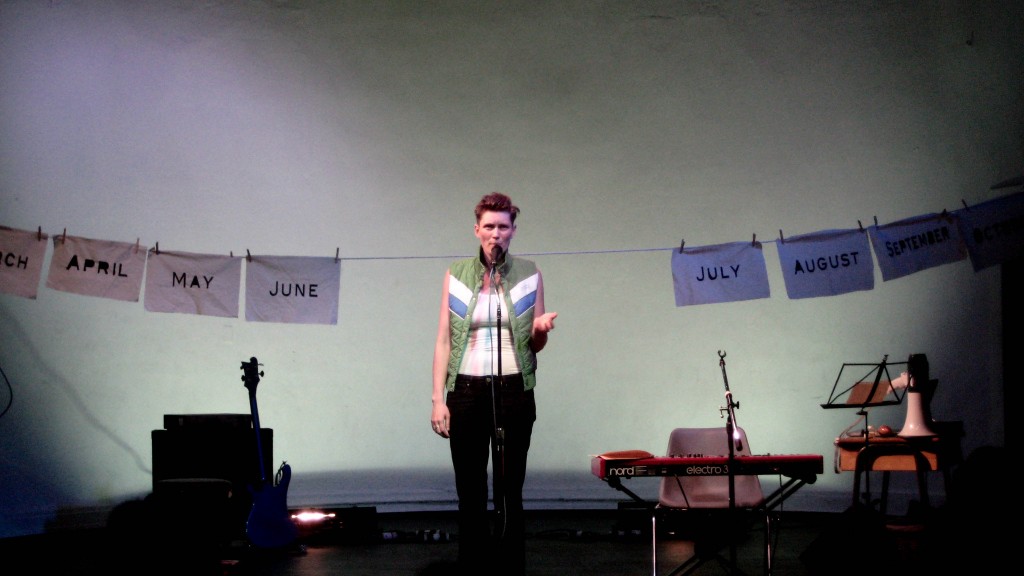
Britt Wright
I recently interviewed Dinah via e-mail, hoping to forge something of substance and depth through the whirring vacuum of cyberspace.
Hi Dinah, how’s life in Rob Ford nation?
He has certainly made municipal politics exciting, but he definitely hasn’t made life better for “bike riding pinkos” like me. My hope is that Olivia Chow will win next month’s election by a landslide. I am very much looking forward to the victory party, and to seeing how much a smart, sensible, and caring person can do as mayor. And if John Tory wins I am going to divorce this town.
In your latest LP, ‘Lullabies and Wake-up Calls,’ you slide in a reference to the Occupy movement. How informed is your lyrical outlook by these anti-capitalist movements?
At its height Occupy was such an exciting moment, as was Idle No More, and Printemps Érable in Quebec. I think these movements are ongoing in different forms, but it seemed for a while like enough people were fed up enough to actually engage in the very dirty work of trying to unsettle capitalism. And the part about these movements successfully engaging the unengaged was probably the most exciting part for me. And the ways that they were run collectively and the ways they centered art and artists.
So being part of some of those demonstrations, for me, offered some rare moments of hope for the world. And I guess some of that hope made it into some of my songs. Mostly my songs about the state of things are not hopeful songs though.
Lyrically I’ve never come across anything like ‘Can I See What’s In Your Backpack’ before. Who are your influences, musically and lyrically?
I listen to a lot of music, and a lot of very different kinds of music. Some of it really relies on storytelling and the poetry of lyrics, like Leonard Cohen or Joni Mitchell or Robert Johnson or The Roots. I very much admire a lyricist whose words can stand on their own – apart from the music – and whose words can encompass both specificity and universality. I also really admire good rappers and spoken-word artists.
But there is also rhythm, and there is also melody, and those are very important to me. And sometimes they are even more important than words. So I listen to a lot of music where there aren’t any lyrics or where the lyrics really aren’t that good and aren’t that important – just pure excellent pop music like Michael Jackson or Robyn, or trip hop like Tricky or Portishead. Not that the lyrics are bad but just that there aren’t very many of them and/or they likely aren’t going to change the world.
If I can find an artist whose work is both totally lyrical and totally musical, then I feel I have won the jackpot. I do feel that way about Leslie Feist, that she is able to marry words and music perfectly, and that each makes the other more potent.
I also really like to read, and so I imagine that has influenced my writing somehow. But I am not sure how, since I don’t read poetry and I definitely couldn’t write a book, ever.
On ‘Lullabies and Wake-up Calls’ you rally against social media and the increasingly abstracted ways in which people choose to interact on a personal level. Do you find these tools impersonal and annoying when attempting to reach out to a potential fanbase in order to raise an awareness of your own music?
I do appreciate email, since many of my friends and family live far away. And I do use Facebook for promotional purposes. I really like that it allows me to be in touch with people who I have met at shows, or people I will likely never meet who heard my music online. But mostly those sites are not for me. I’m just more of an in-person kind of person, and I feel like I already have to spend too much time in front of a screen. I don’t have a cell phone and I don’t tweet and I hope to never have to do either. I would rather speak to three people face to face after a show than send a tweet out to 600,000 Twitter followers.
I don’t feel that we can call things social media if what they produce is a culture where everyone looks at a tiny screen instead of interacting with the people who are right in front of them. I think they should be called anti-social media. But I recognize that other people enjoy that kind of interaction more than I do. Texting just makes me panic.
But I am completely reliant on computers and other machines in order to write and record music, so I am only a selective Luddite. I try to be aware of my own contradictions, as well as my privilege in terms of what music tools I have access to. I really believe that I wouldn’t have been a musician if I lived in a time before computers. So I try not to get too sanctimonious about disliking cell phones, as I sit in front of my nicely kitted out iMac.
Although Lullabies and Wake-up Calls appears to be an intensely personal album, songs such as ‘Can I See What’s In Your Backpack’ seem to have been written through the perspective of an automaton. Throughout the LP as a whole there seems to be a binary divide between the playful and the bureaucratic, the organic and the automatic – is this an accurate interpretation of the themes of the album?
Really good question. And I think you are mostly bang on. Thanks for listening so closely. I am reluctant to embrace the term automaton, however, because to me it evokes a much more intentionally computerized sound, like Lady Gaga or Kraftwerk. Although my work makes use of machines, I don’t think it sounds like it was written by a machine. And in fact I am always really flattered when people mistakenly think that I record with a band, because to me that implies a certain degree of unpredictability and musicality.
For sure this album is both organic and inorganic, and its subjects are both inward-looking and outward-looking. The question of the cover artwork is a good one too, because there might be some commentary there about the politics of representation in a narcissistic culture, and the images there both are and aren’t me. And I think it is not insignificant that I am just a floating head. Although this is all speculation on my part since it was my friend Jayme’s design and not mine!
It’s almost been a year since you released your last LP. When can we expect to hear a follow-up to Lullabies and Wake-up Calls?
Fall is a very good time to settle back into writing. And I am definitely doing that, though I am not sure what my next project will look like. I’ve got a few ideas on the go, and will wait and see which one takes on the most urgency. I am working on a sort of trip hop album, and an album of songs for ukulele. I am also producing a couple of other people’s albums, so that is new and exciting for me.
Lullabies and Wake-up Calls can be ordered from Dinah’s site.

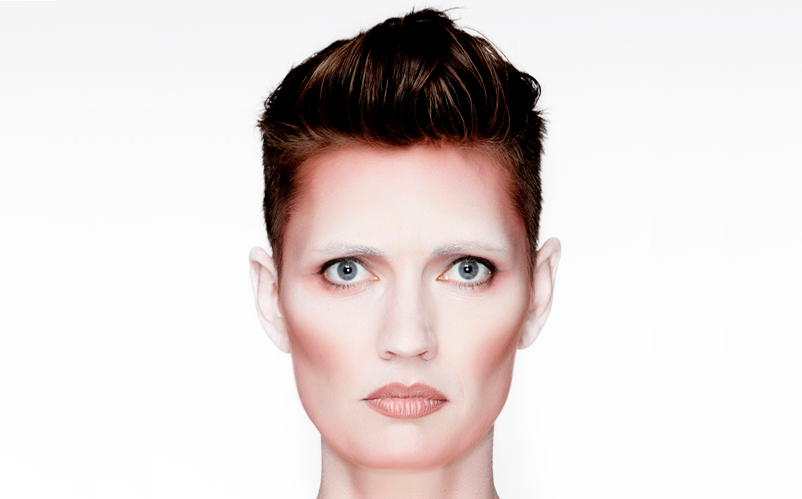






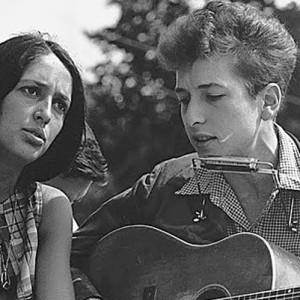
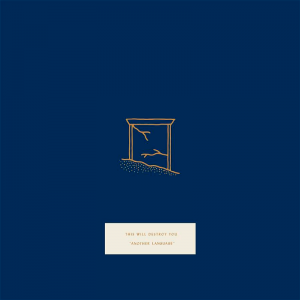
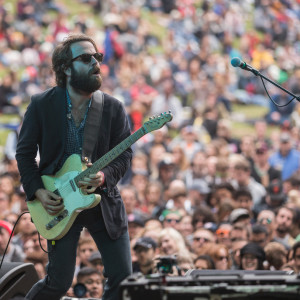
Leave a reply